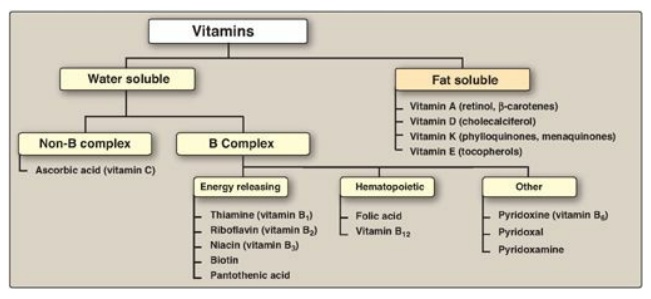Overview of Vitamins
| Home | | Biochemistry |Chapter: Biochemistry : Vitamins
Vitamins are chemically unrelated organic compounds that cannot be synthesized in adequate quantities by humans and, therefore, must be supplied by the diet.
Vitamins
OVERVIEW
Vitamins are chemically
unrelated organic compounds that cannot be synthesized in adequate quantities
by humans and, therefore, must be supplied by the diet. Nine vitamins (folic
acid, cobalamin, ascorbic acid, pyridoxine, thiamine, niacin, riboflavin,
biotin, and pantothenic acid) are classified as water soluble. Because they are
readily excreted in the urine, toxicity is rare. However, deficiencies can
occur quickly. Four vitamins (A, D, K, and E) are termed fat soluble (Figure
28.1). They are released, absorbed, and transported (in chylomicrons) with
dietary fat. They are not readily excreted, and significant quantities are
stored in the liver and adipose tissue. In fact, consumption of vitamins A and
D in excess of the Dietary Reference Intakes can lead to accumulation of toxic
quantities of these compounds. Vitamins are required to perform specific
cellular functions. For example, many of the water-soluble vitamins are
precursors of coenzymes for the enzymes of intermediary metabolism. In contrast
to the water-soluble vitamins, only one fat-soluble vitamin (vitamin K) has a
coenzyme function.

Figure 28.1 Classification of
the vitamins.
